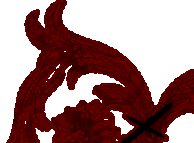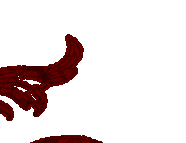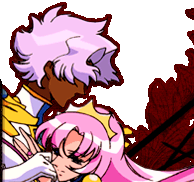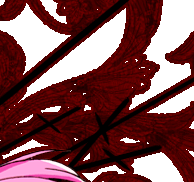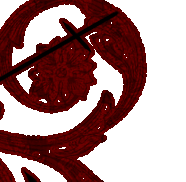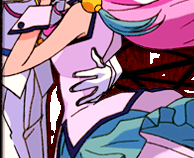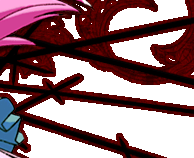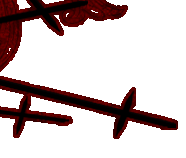
This analysis
was donated by Ryan Haecker.  "The Revolution of the World"  Much of the psychological imaginings and recollections relate to the private experiences and memories of the characters. These ecstasies of regret and expectation are possible in “Revolutionary Girl Utena” because time and space are presented to the audience as entirely ideal and subjective in relation to the characters' private mental experience. If much of the drama of "Revolutionary Girl Utena" is interpreted as the personal illusion of Utena Tenjou, then the cast may plausibly be considered to be merely the archetypes of girlish romantic fantasies- or the ideal representation of adolescent social life for Utena’s self-consciousness. This interpretation is supplemented by the flamboyant hair of the duelists which encompasses the whole of the color spectrum from blue purple to red. With this understanding, Akio is clearly the supreme representative of aristocratic Manhood whom Touga idolizes and aspires to equal. Similarly Saionji and Nanami idolize Touga and aspire to match his prestige according to the distinctive archetypes of their sex. Utena and Juri are both masculine women with female companions, yet Utena's relationship is fraternal while Juri's is romantic. Utena and Micki are noticeably less concerned with romance than the other characters, yet they each remain attached to Anthy and Kozue respectively.
Much of the psychological imaginings and recollections relate to the private experiences and memories of the characters. These ecstasies of regret and expectation are possible in “Revolutionary Girl Utena” because time and space are presented to the audience as entirely ideal and subjective in relation to the characters' private mental experience. If much of the drama of "Revolutionary Girl Utena" is interpreted as the personal illusion of Utena Tenjou, then the cast may plausibly be considered to be merely the archetypes of girlish romantic fantasies- or the ideal representation of adolescent social life for Utena’s self-consciousness. This interpretation is supplemented by the flamboyant hair of the duelists which encompasses the whole of the color spectrum from blue purple to red. With this understanding, Akio is clearly the supreme representative of aristocratic Manhood whom Touga idolizes and aspires to equal. Similarly Saionji and Nanami idolize Touga and aspire to match his prestige according to the distinctive archetypes of their sex. Utena and Juri are both masculine women with female companions, yet Utena's relationship is fraternal while Juri's is romantic. Utena and Micki are noticeably less concerned with romance than the other characters, yet they each remain attached to Anthy and Kozue respectively.
None of the other characters in "Revolutionary Girl Utena" so extremely embody the masculine and feminine characteristics as Akio and Anthy. The romance of Dios and Anthy at the beginning of time was the consummation of the archetypal personifications of Man and Woman. The progeny of Anthy and Dios would therefore comprise all of humanity, and would afterwards be divided into the two sexes of men and women. As with "the Symposium", all later humans would be particular instantiations of these primordial archetypes of Man and Woman. However, no later human could thereafter instantiate these archetypes with the characteristics of masculinity and femininity as completely and unreservedly as this original couple. As all later humans are the result of this consummate union, they too share in some relative portion of the characteristics of both Anthy and Akio. The relative instantiation of masculine and feminine characteristics explain the distinct romances and aspirations of the characters. For this reason, much of the dramatic tension among the characters results from their inability to achieve or subvert, in their person, these ideal archetypes of Man and Woman.
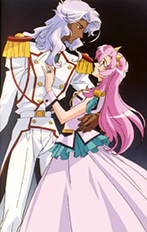 All of the characters in “Revolutionary Girl Utena” struggle to resolve their romantic fixations and anxieties, and come to the fullest realization of their social and romantic selfhood in the final story-arc of the series. This conclusion is therefore the teleological end of the characters' maturation and the actualization of their frequently alluded to "Absolute Destiny Apocalypse". In conformity to her childhood dream, Utena Tenjou was offered an idyllic marriage with Akio, her prince, as the reward for her triumphs in the duels. When Utena rose to the dueling arena for the final duel of “the Revolution” she witnessed the large orb which Akio had previously spoken to holding aloft an image of the Prince. Yet this prince is inverted and as Akio walked out from inside he told Utena that the benevolent Prince Dios, “the Beginning of the World”, was gone and the orb was merely his grave, “the Grave of the Prince”. With a self-assuredness which recalls Nietzsche’s infamous aphorism, Akio acted consistently as though Dios was dead and gone from the cosmos of the Ohtori Academy. Both Utena’s ambition for her own self-actualization and Akio’s ambition to possess the power of Dios are motivated through the absence of the Prince and the ‘fallen’ condition of the setting which his absence had signified.
All of the characters in “Revolutionary Girl Utena” struggle to resolve their romantic fixations and anxieties, and come to the fullest realization of their social and romantic selfhood in the final story-arc of the series. This conclusion is therefore the teleological end of the characters' maturation and the actualization of their frequently alluded to "Absolute Destiny Apocalypse". In conformity to her childhood dream, Utena Tenjou was offered an idyllic marriage with Akio, her prince, as the reward for her triumphs in the duels. When Utena rose to the dueling arena for the final duel of “the Revolution” she witnessed the large orb which Akio had previously spoken to holding aloft an image of the Prince. Yet this prince is inverted and as Akio walked out from inside he told Utena that the benevolent Prince Dios, “the Beginning of the World”, was gone and the orb was merely his grave, “the Grave of the Prince”. With a self-assuredness which recalls Nietzsche’s infamous aphorism, Akio acted consistently as though Dios was dead and gone from the cosmos of the Ohtori Academy. Both Utena’s ambition for her own self-actualization and Akio’s ambition to possess the power of Dios are motivated through the absence of the Prince and the ‘fallen’ condition of the setting which his absence had signified.
In this final Duel of the Revolution, Akio revealed how he had scripted the "fairy-tale" illusions of the duels, the arena and the inverted castle. Akio disclosed his metaphysical preeminence when he described how "there is no place higher than this room [the Planetarium]. This room is the summit of the Ohtori Academy; the summit of the world itself." Akio disclosed that the prior duels had been arranged as an illusion without any real danger, while victory in a duel against him is both dangerous and impossible. Akio, “the End of the World”, intended to fulfill the series’ oft repeated millenarianist prognostications and “Revolutionize the World”. To 'revolutionize' something is to overturn and make something anew. The conflicts of "Revolutionary Girl Utena" are centered on romance, sexuality and gender roles. Accordingly it must be this sexual-order which the duelists intend to ‘revolutionize’. However the essential natures of the sexes were fixed in the biological differences of Man and Woman in the beginning through the ‘original sin’ of Dios and Anthy's primordial union. With this knowledge, Akio conspired to "Revolutionize the World" to reverse this originary creation whose results had been the "fallen" romances of Man and Woman. He aspired to gain the demiurgic potential which Dios possessed in the beginning prior to ‘the fall’, so that he might redesign the cosmos uninhibited by the fixity of the sexes and the sexual order of nature.
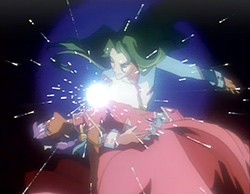 Utena’s confinement in the coffin and the determination of her sex are represented with the uterine symbol of the rose. The phallic symbol of the sword which, when pulled from the heart of the duelists, represents their sanguine ambition to possess their object and transform their circumstances. The succession of distinct sword drawing sequences indicates that these are empowered through the contested romances, embodied in the duels, and that their power increases concomitantly with the growing awareness and narrative progression of the duelists. Therefore when Akio drew his sword of Dios from Anthy during the duel of the Revolution, this sword had been empowered through the romantic conflicts and heartbreaks of all the previous duels. Thusly empowered it was through the Sword of Dios that Akio aspired to open the Rose Seal and possess the power of Dios to revolutionize the world. Yet Utena took this sword from him, rejected the fantastic escape offered to her and fulfilled her princely ambition by challenging Akio, “the End of the World”, to a final duel to liberate the Rose Bride and all women thusly signified from everlasting enfeeblement and bondage. At this moment when cross-dressing Utena challenged the god-figure Akio to liberate her girlfriend Anthy, "Revolutionary Girl Utena" could most plausibly be interpreted as a feminist allegory.
Utena’s confinement in the coffin and the determination of her sex are represented with the uterine symbol of the rose. The phallic symbol of the sword which, when pulled from the heart of the duelists, represents their sanguine ambition to possess their object and transform their circumstances. The succession of distinct sword drawing sequences indicates that these are empowered through the contested romances, embodied in the duels, and that their power increases concomitantly with the growing awareness and narrative progression of the duelists. Therefore when Akio drew his sword of Dios from Anthy during the duel of the Revolution, this sword had been empowered through the romantic conflicts and heartbreaks of all the previous duels. Thusly empowered it was through the Sword of Dios that Akio aspired to open the Rose Seal and possess the power of Dios to revolutionize the world. Yet Utena took this sword from him, rejected the fantastic escape offered to her and fulfilled her princely ambition by challenging Akio, “the End of the World”, to a final duel to liberate the Rose Bride and all women thusly signified from everlasting enfeeblement and bondage. At this moment when cross-dressing Utena challenged the god-figure Akio to liberate her girlfriend Anthy, "Revolutionary Girl Utena" could most plausibly be interpreted as a feminist allegory.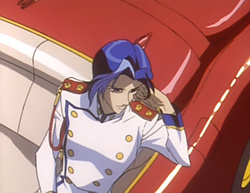
Akio appeared to require the duelists to gain this potential power, and to have coordinated these duels many times previously at the Ohtori Academy. The duels throughout the series represent the contest of the wills between lovers entangled within a traumatic romance. Their conflicted affections, whose aspirations are physically embodied in their swords, both propel the narrative and empower the champion duelist. The love which is most inspiring and real to the duelists is unmade through each duel; and through these defeats the affectionate willfulness of the losers are nonetheless preserved and subsumed within those of the victors, who is then further empowered by their heartbreak until the final duel to decide the fantastic design of the cosmos and the “Revolution of the World”. Within the supernatural setting of the Ohtori Academy, where fantasy and ideals have power and embodiment, the heartbreak of the duelists confers supernatural gifts. While riding in Akio’s convertible in episode 29, Ruka casually mentions that "To work miracles, you need a sacrifice" and "you only get miracles by standing on the sacrifices of others!" Within these duels, the frustrated passions of the duelist's love, incarnated in their swords drawn from the heart, granted Akio "the power to Revolutionize the World". In an act of no small self-surrender Anthy handed the Sword of Dios to Akio who then proceeded to attempt to open the Rose Seal. All of the duelists had coveted this power, but none were fully aware of its nature nor could feasibly achieve it. As no finite being can overturn and reconstruct the order of the cosmos, the characters' initiation eventually disclosed to them the futility of their ambitions. This realization, along with the growing actualization of their sexed role in the natural order of the universe, allowed these characters to be contented with their humility and finitude as sexed and embodied beings. If feminism means a revolutionary emancipation from these sexed roles, then all of the characters of "Revolutionary Girl Utena" finally concede this to be impossible. Characteristically Utena and Touga are the last to surrender their fantastic ambitions.
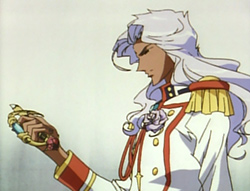 Utena’s final gambit occured during the Duel of the Revolution when she announced “I’m going to be a Prince!” and the floating sky-castle, the symbol of her girlhood fixation, shattered to pieces- and Akio trembled! In this contest, Utena represented the consummate ambition of the former duelists to emancipate themselves from the determinism of their sexed natures and the harrowing heartbreaks concomitant with their misbegotten romances. More importantly, in seeking to protect and liberate Anthy Utena embodied the hope of all women to empower themselves, from within the sisterhood of women, to protect and actualize the abused and marginalized among them. However both Akio and the audience have by now understood Utena’s heroism to be tragically unrealizable. Akio soberly told Utena “You only know play dueling”, or the ideal dueling of embattled lovers. As Anthy could not allow Utena to interfere with her cosmic role as the Rose Bride, she soon backstabbed Utena with the Sword of Dios. Both Akio's revelation and this mortal injury to Utena demonstrate that this final duel was entirely real rather than merely an illusion. As the embodiment of all women, Anthy's betrayal represents the betrayal of Utena's emancipatory and feminist ambitions by her womanhood and the biological determinism of her sex. Utena then collapsed and conceded that she could never have become a prince. As Utena renounced her princely ambitions, it appeared that sexual determinism had finally triumphed over the emancipatory feminist narrative.
Utena’s final gambit occured during the Duel of the Revolution when she announced “I’m going to be a Prince!” and the floating sky-castle, the symbol of her girlhood fixation, shattered to pieces- and Akio trembled! In this contest, Utena represented the consummate ambition of the former duelists to emancipate themselves from the determinism of their sexed natures and the harrowing heartbreaks concomitant with their misbegotten romances. More importantly, in seeking to protect and liberate Anthy Utena embodied the hope of all women to empower themselves, from within the sisterhood of women, to protect and actualize the abused and marginalized among them. However both Akio and the audience have by now understood Utena’s heroism to be tragically unrealizable. Akio soberly told Utena “You only know play dueling”, or the ideal dueling of embattled lovers. As Anthy could not allow Utena to interfere with her cosmic role as the Rose Bride, she soon backstabbed Utena with the Sword of Dios. Both Akio's revelation and this mortal injury to Utena demonstrate that this final duel was entirely real rather than merely an illusion. As the embodiment of all women, Anthy's betrayal represents the betrayal of Utena's emancipatory and feminist ambitions by her womanhood and the biological determinism of her sex. Utena then collapsed and conceded that she could never have become a prince. As Utena renounced her princely ambitions, it appeared that sexual determinism had finally triumphed over the emancipatory feminist narrative.
After this final duel, Akio walked towards the Rose Seal as the image of the Rose was completed behind him and thereby symbolized the completion of the duels. Then Anthy began to be lifted into the air as she submitted to be immolated by a ceaseless torrent of steel swords from every direction. As the swords are phallic and Anthy is the embodiment of Woman, this self-sacrifice represents the consummation of the Child within Woman's womb. Anthy appeared to submit to this and Akio to allow it, because both believed it to be both necessary and inevitable, like the wintry descent of Orpheus, for the procreation and continuity of humanity. Anthy must continually be sacrificed to allow for perpetuation of human sexual reproduction. Like the transience of memory and generations she is continually reborn anew with the natural world, while Akio remains eternal and immortal like the Platonic Forms. At this moment of self-sacrifice and supernatural consummation, Akio intended to force open the now revealed "Rose Seal" which he believed to contain "the Power to Revolutionize the World". As consummation constitutes the creation of an entirely new person, the Rose Seal in this moment uniquely contains the hidden power of Woman’s womb. In this moment of supernatural consummation, as Anthy is being immolated by the “Swords of Human Hatred”, new life is being created within the Rose Seal.
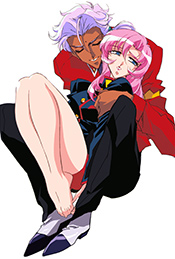 Before stabbing Utena the Rose Bride had opened her eyes, in the way as she had done upon recognizing the miraculous power of Prince Dios and whispered to Utena that although she had the nobility of Dios she was also a girl and could therefore never become a prince. This betrayal by Anthy, who embodies Womanhood and the determination of the female sex, concluded Utena’s cross-dressing and gender-transgressing ambitions to, as a girl, usurp the princely headship of the Man for Woman. Yet although Utena was impaled upon a sword by Anthy, she nonetheless struggled forward to interrupt Anthy’s immolation by opening the Rose Seal herself. As she did so, the living Prince Dios appeared before her and informed Utena “I still exist”! Then Dios, the almighty God of all creation, interceded on her behalf. After Akio’s efforts to open the seal were shown to be futile, Utena rushed forward and with her bare fingers began to pry open the as yet unmoved door. To Akio’s astonishment the “Swords of Human Hatred” halted in mid-air as though frozen in time. Then Prince Dios hopped unto the horse of a Merry-Go-Round, the symbol of the Rose shattered, and Utena swung open the Rose Seal! The dueling arena is an ontologically superior and more real setting in which the contested passions of lovers is embodied. Akio revealed that the arena is one and the same with his planetarium and therefore the ontologically “highest point” in the Ohtori Academy. However the Rose Seal opens beyond even this supreme ontological point into a void beyond all space and time. Here, beyond the spatio-temporal universe, Utena found Anthy naked as a babe in a fetal slumber awaiting her rebirth. The power of creation, which lies hidden in Woman’s womb and of which Anthy was the supreme embodiment could not be located within the spatio-temporal universe which witnesses the mutability and reconfiguration of all already existing elements. Rather creation, both of radically new things and of new life, proceeds from beyond the realm of our experience. Akio had awaited this moment, in which the accumulated romantic aspirations of the duelists consummately unite with the supernatural fertility of the Rose Bride through the power of the Sword of Dios, to test his power to interrupt this supernatural cosmogenesis and bend its power to his design. The hidden power of creation, the potentiality of Woman’s womb, is contained within the Rose Seal and was a power which Akio, as the embodiment of the Platonic form of Manhood, did not have yet nonetheless required to remake and revolutionize the cosmos.
Before stabbing Utena the Rose Bride had opened her eyes, in the way as she had done upon recognizing the miraculous power of Prince Dios and whispered to Utena that although she had the nobility of Dios she was also a girl and could therefore never become a prince. This betrayal by Anthy, who embodies Womanhood and the determination of the female sex, concluded Utena’s cross-dressing and gender-transgressing ambitions to, as a girl, usurp the princely headship of the Man for Woman. Yet although Utena was impaled upon a sword by Anthy, she nonetheless struggled forward to interrupt Anthy’s immolation by opening the Rose Seal herself. As she did so, the living Prince Dios appeared before her and informed Utena “I still exist”! Then Dios, the almighty God of all creation, interceded on her behalf. After Akio’s efforts to open the seal were shown to be futile, Utena rushed forward and with her bare fingers began to pry open the as yet unmoved door. To Akio’s astonishment the “Swords of Human Hatred” halted in mid-air as though frozen in time. Then Prince Dios hopped unto the horse of a Merry-Go-Round, the symbol of the Rose shattered, and Utena swung open the Rose Seal! The dueling arena is an ontologically superior and more real setting in which the contested passions of lovers is embodied. Akio revealed that the arena is one and the same with his planetarium and therefore the ontologically “highest point” in the Ohtori Academy. However the Rose Seal opens beyond even this supreme ontological point into a void beyond all space and time. Here, beyond the spatio-temporal universe, Utena found Anthy naked as a babe in a fetal slumber awaiting her rebirth. The power of creation, which lies hidden in Woman’s womb and of which Anthy was the supreme embodiment could not be located within the spatio-temporal universe which witnesses the mutability and reconfiguration of all already existing elements. Rather creation, both of radically new things and of new life, proceeds from beyond the realm of our experience. Akio had awaited this moment, in which the accumulated romantic aspirations of the duelists consummately unite with the supernatural fertility of the Rose Bride through the power of the Sword of Dios, to test his power to interrupt this supernatural cosmogenesis and bend its power to his design. The hidden power of creation, the potentiality of Woman’s womb, is contained within the Rose Seal and was a power which Akio, as the embodiment of the Platonic form of Manhood, did not have yet nonetheless required to remake and revolutionize the cosmos.
Utena had heretofore enjoyed the aid of miraculous intervention in her duels because she was uniquely uninterested in the romances or ambitions of the other duelists, and rather dueled in defense of her friendship with Anthy. It is revealing that Utena’s single loss occurred in episode 12 when she briefly fancied Touga. Despite the hopes of the duelists to gain the power of “eternity” and “miracles”, Akio described the castle which floats above the arena to be, like Dios, merely an illusion. However both Akio and Anthy are repeatedly stunned and alarmed by the miraculous interventions which occur on behalf of Utena. Utena’s selfless courage and princely nobility were her unique and distinguishing characteristics and, as Prince Dios informed her, it is likely as a result of these traits that Utena is favored. The opening of the Rose Seal, which even Akio had thus far failed to achieve, might only be explained through the divine intercession of a power greater than Akio. As a result of Utena’s faith in the promise and cosmic continuity of her friendship with Anthy Dios uniquely interceded on her behalf, rather than for Akio, to open the Rose Seal. Upon her opening the Rose Seal, a coffin was displayed in place of the former doorway and Utena desparately reached for Anthy’s hand with which to pull her from the Void. But as she did so Anthy grew frightened for Utena and pleaded with her to withdrawal from the Void. Utena repeated her calls for Anthy as the swords, which had formerly been directed at Anthy, began to swirl about wildly. Anthy reached for Utena and, as their hands briefly joined, Anthy plummeted from the Arena through the clouds to the world below. The “Swords of Human Hatred” were then directed towards Utena, as a sacrifice in Anthy’s stead, and raced towards her as the camera panned away.
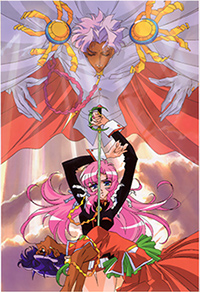 Throughout “Revolutionary Girl Utena” allusions had been made to the complimentarity of Utena Tenjou and Anthy Himemiya. The significance of the relationship of Utena and Anthy is the least explicit yet most monumental theme of "Revolutionary Girl Utena", and were it to go unnoticed then no sensible explanation of the conclusion might ever be forthcoming. Although the characters have been revealed to be the personification of Platonic Ideas and the Ohtori Academy has been shown to be an illusory setting, for whom these phantasms had been made to afflict has not yet been disclosed. And although Utena had been the protagonist of the series, she noticeably fails to appear in the concluding scenes following the duel to "Revolutionize the World". Instead the audience is shown Anthy Himemiya who appears to have remained at the Ohtori Academy while Utena’s absence had gone largely unnoticed. Indeed with her surrogate sacrifice in the Duel of the Revolution, Utena had vanished entirely from the world of the Ohtori Academy. However by this sacrifice of Utena in place of the Rose Bride, her real significance has been retained in and through Anthy Himemiya. Although she was divided within her self-consciousness by the tragedy of parents death and through the intercession of Prince Dios, Utena and Anthy had always been merely two aspects of the archetype of Womanhood; the eternal Platonic Idea of Woman which is more real than any particular woman and exists beyond the spatio-temporal universe of the Ohtori Academy. The absence of Utena Tenjou in the concluding scenes signifies, not her defeat in the duel, but her triumph through her mortal sacrifice. Through Utena’s surrogate sacrifice Anthy continues to live within the Ohtori Academy with a now unified self-consciousness and the inspiration of Utena’s heroic friendship. Utena had vanished from the illusory world of the Ohtori Academy, yet really exists in unison with the self-consciousness of Anthy who as the Rose Bride is simultaneously the self-consciousness of the archetype of Woman and all women collectively. “Revolutionary Girl Utena” concludes with the emergence of the collective self-consciousness of women, not as a feminist emancipation from the determinism of the female sex, but as women have reconciled within themselves their heroic ambitions for self-agency and actualization with their essential nature as women. The illusory separation of the Prince and the Rose Bride then vanished as Anthy Himemiya had united within herself both aspects of Womanhood, and also within all women for whom she is the living embodiment.
Throughout “Revolutionary Girl Utena” allusions had been made to the complimentarity of Utena Tenjou and Anthy Himemiya. The significance of the relationship of Utena and Anthy is the least explicit yet most monumental theme of "Revolutionary Girl Utena", and were it to go unnoticed then no sensible explanation of the conclusion might ever be forthcoming. Although the characters have been revealed to be the personification of Platonic Ideas and the Ohtori Academy has been shown to be an illusory setting, for whom these phantasms had been made to afflict has not yet been disclosed. And although Utena had been the protagonist of the series, she noticeably fails to appear in the concluding scenes following the duel to "Revolutionize the World". Instead the audience is shown Anthy Himemiya who appears to have remained at the Ohtori Academy while Utena’s absence had gone largely unnoticed. Indeed with her surrogate sacrifice in the Duel of the Revolution, Utena had vanished entirely from the world of the Ohtori Academy. However by this sacrifice of Utena in place of the Rose Bride, her real significance has been retained in and through Anthy Himemiya. Although she was divided within her self-consciousness by the tragedy of parents death and through the intercession of Prince Dios, Utena and Anthy had always been merely two aspects of the archetype of Womanhood; the eternal Platonic Idea of Woman which is more real than any particular woman and exists beyond the spatio-temporal universe of the Ohtori Academy. The absence of Utena Tenjou in the concluding scenes signifies, not her defeat in the duel, but her triumph through her mortal sacrifice. Through Utena’s surrogate sacrifice Anthy continues to live within the Ohtori Academy with a now unified self-consciousness and the inspiration of Utena’s heroic friendship. Utena had vanished from the illusory world of the Ohtori Academy, yet really exists in unison with the self-consciousness of Anthy who as the Rose Bride is simultaneously the self-consciousness of the archetype of Woman and all women collectively. “Revolutionary Girl Utena” concludes with the emergence of the collective self-consciousness of women, not as a feminist emancipation from the determinism of the female sex, but as women have reconciled within themselves their heroic ambitions for self-agency and actualization with their essential nature as women. The illusory separation of the Prince and the Rose Bride then vanished as Anthy Himemiya had united within herself both aspects of Womanhood, and also within all women for whom she is the living embodiment.
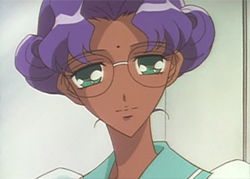 The possession of loved ones, like the eternity of memories, is a principal theme in “Revolutionary Girl Utena” which continually highlights the private experience of time and space. That Utena had vanished emphasizes that eternity, fame and remembrance, like friendship and romance, are ultimately impossible to achieve. The new students occupy the same spaces as Utena's classmates without an appreciation of its emotional significance; alluding to the ephemeral quality of memory, emotion and self-importance in the succession of generations. Akio is shown working at a heretofore unseen desk with piles of paperwork, planning to recruit a new group of student duelists. Upon politely asking for, rather than commanding, Anthy's assistance, she informs Akio that she is leaving the Academy to search for Utena. Anthy tells Akio "You really don't know what has happened at all, do you? It doesn't matter. By all means, stay in this cozy coffin of yours and continue to play Prince. [Utena] isn't gone at all. She's merely vanished from your world." Akio's desk and paperwork, like his car and planetarium, represent the distinctively non-heroic bourgeois culture of the modern world, in contrast to the former aristocratic dress of the 18th century Ancien Regime. The conclusion of "Revolutionary Girl Utena" announces the psychological and cultural shift from the pre-modern to the modern world.
The possession of loved ones, like the eternity of memories, is a principal theme in “Revolutionary Girl Utena” which continually highlights the private experience of time and space. That Utena had vanished emphasizes that eternity, fame and remembrance, like friendship and romance, are ultimately impossible to achieve. The new students occupy the same spaces as Utena's classmates without an appreciation of its emotional significance; alluding to the ephemeral quality of memory, emotion and self-importance in the succession of generations. Akio is shown working at a heretofore unseen desk with piles of paperwork, planning to recruit a new group of student duelists. Upon politely asking for, rather than commanding, Anthy's assistance, she informs Akio that she is leaving the Academy to search for Utena. Anthy tells Akio "You really don't know what has happened at all, do you? It doesn't matter. By all means, stay in this cozy coffin of yours and continue to play Prince. [Utena] isn't gone at all. She's merely vanished from your world." Akio's desk and paperwork, like his car and planetarium, represent the distinctively non-heroic bourgeois culture of the modern world, in contrast to the former aristocratic dress of the 18th century Ancien Regime. The conclusion of "Revolutionary Girl Utena" announces the psychological and cultural shift from the pre-modern to the modern world.
As Anthy departs the illusory and adolescent fantasy of the Ohtori Academy into the undistinguishable white void outside, the final bells ring, and she is depicted walking assertively, wearing modern cosmopolitan clothes as an independent woman. Anthy is, as all women, then emancipated from eternal bondage to Akio and the demeaning role of the Rose Bride to become a modern individual with independent thought and action unbeholden to the demands of social obligation, men, family, and history. Yet this is no simple fairy-tale ending. On the contrary, it represents the beginning of an unceasing struggle for women to personally and collectively determine their role, identity, and action within a modern individualist society which is absent of the unquestioned authority of customary gender roles and their concomitant moral obligations. Anthy, and all women, must now freely and independently actualize herself within a massive modern society which, rather than determining her actions, is cold and indifferent to her. As with Goethe’s tragic Doctor Faustus, Anthy has a will and an ambition without the social and historical context to make use of them. She carries with her only what she, as a modern subjective individual, has become. Anthy is inspired by the self-sacrifice of princely Utena, the friendship they shared and the living Prince Dios to use her newfound independence for the self-awareness and actualization of all women. In this way Utena's self-sacrifice exemplifies the theme that, although maternity forever requires self-sacrifice for the chain of generations, the bonds of friendship shared among women can elevate the conscience of all women from the condition of the "Rose Bride" to that of the heroic "Prince".

 |

